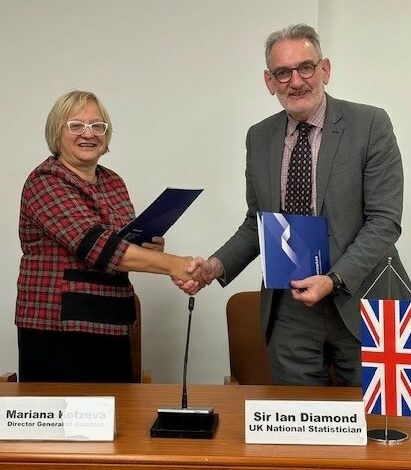When the Office for National Statistics ceased to be a member of the European Statistical System in 2020, most work with Eurostat, the statistical office of the European Union, ended. National Statistician, Sir Ian Diamond, explains how a new arrangement on statistical cooperation marks a reset in our working relationship.
Earlier today, at the Bureau of the Conference of European Statisticians in Warsaw, I met with Mariana Kotzeva, Director General of Eurostat, to formalise a new arrangement on statistical cooperation. It is the first such agreement since the UK’s departure from the EU and marks a fresh approach to how our two organisations will work together.
While it stems from commitments made under the UK-EU Trade and Cooperation Agreement, it stands as a clear example of how practical and mutually beneficial cooperation can continue between the UK and EU in the area of statistics.
The Evolution of the ONS-Eurostat Relationship
Since the UK left the European Statistical System (ESS) in 2020, cooperation between the ONS and Eurostat has naturally scaled back. Before Brexit, the ONS worked closely with Eurostat to ensure statistical comparability across EU countries and to share data in areas of mutual importance. Brexit, however, required both sides to reconsider how we could engage going forward.
Over the past few years, the ONS has maintained strong relationships with other national statistical agencies around the world, building a network of international cooperation. This new arrangement with Eurostat reflects our commitment to maintaining a practical and effective working relationship with our European counterparts, while recognising the changing nature of that relationship.
A Pragmatic Approach to Cooperation
This arrangement is built on a recognition that both the ONS and Eurostat will benefit by cooperating with data in areas such as GDP, National Accounts, Trade, and Foreign Investment.
These are crucial for both organisations to provide the high-quality, reliable statistics needed to inform policy decisions, and they also underpin the UK’s participation in EU programmes such as Horizon Europe and Copernicus. This partnership will allow the UK to contribute effectively to these programmes and benefit from the insights and data they produce.
Ensuring Oversight and Continued Collaboration
It is important to emphasise that this agreement is just the beginning. Both organisations are committed to ensuring that this new relationship is productive and that it serves the needs of both UK and EU stakeholders.
The UK Statistics Authority (UKSA) will meet regularly with Eurostat to discuss where additional collaboration could be beneficial. While the initial focus is on the transfer of GDP data we remain open to exploring other areas of statistical cooperation.
At its core, this arrangement is about maintaining effective, practical links that allow us to continue producing high-quality statistics that reflect the reality of our economies and societies.
Looking Ahead
This new arrangement does not signal a return to our pre-Brexit statistical relationship with Eurostat. I will continue to make decisions around standards for economic statistics in consultation with the National Statistician’s committee, chaired by Martin Weale. The arrangement does, however, represent a constructive and pragmatic step forward. In today’s data-driven world, maintaining strong links with international statistical bodies is more important than ever.
We at the ONS are looking forward to working with Eurostat to ensure this cooperation produces the high-quality statistics that are so crucial to understanding and responding to the challenges of today. As we move forward, we will continue to assess where further cooperation can bring value, always guided by the need to produce the best possible data for all those who rely on our work.
